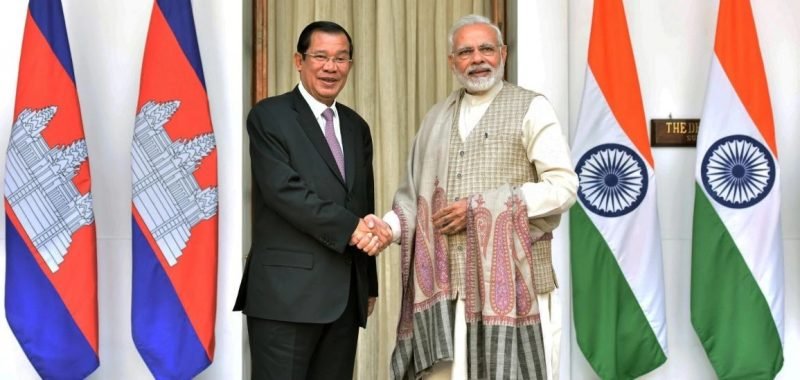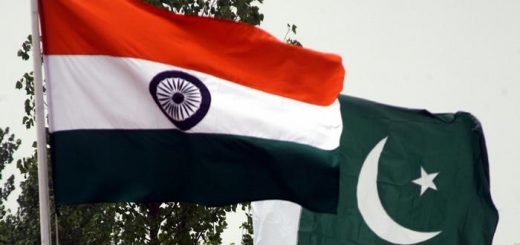Hun Sen’s China Dependence Hinders Indian Trade Potential

There are many costs to Cambodia from the blind reliance on China pursued by our Prime Minister, Hun Sen.
There is firstly the political and military risk created by a strategic alliance with an expansionist and bellicose power as China.
There are also economic and commercial costs. Among them is the chance to fully develop the potential of our relationships with other key trading partners. India is a prime example.
The relationship between Indian and Cambodia has a long and distinguished history. India provided the principal elements of Cambodia’s civilisation, in particular the different religions that have existed in our region for 2,000 years.

During the Cold War, both countries were part of the Non-Aligned Movement. Prince Norodom Sihanouk and Prime Minister Jawaharlal Nehru were pioneers of the concept that newly independent and poor countries should pursue their own interests, rather than lining up behind a superpower at the Bandung Conference in 1955.
Following the Geneva Accords on Indochina in 1954 which, among other things, guaranteed Cambodia’s independence and souvereignty, India, with Poland and Canada, were part of the International Commission of Control which supervised the departure of foreign troops from Cambodia.
India has contributed to the removal of landmines in Cambodia. It is a signatory to the Paris Peace Agreements on Cambodia in 1991 and sent personnel to help with the conduct of the UN-sponsored elections in 1993. New Delhi has a role to play in ensuring the development of a “regime of liberal and pluralist democracy” in Cambodia as laid down in the accords. This is needed to guarantee the neutrality of our country which should refuse the installation of foreign military bases. Such bases threaten regional security from the Philippines to India, from Indonesia to Thailand.
But Non-Aligned is not a concept which former Khmer Rouge military commander Hun Sen understands. His dreadful record on human rights and democracy has led to the partial loss of free-trade privileges with the European Union under the Everything But Arms Programme.
Hun Sen’s response has been to seek a new free-trade deal with China. The date of signature of the new accord was first planned for August 12 — the very day the EU removed some duty-free trading rights. But signature was postponed at the last minute. The agreement would not constitute a viable international trade strategy for Cambodia. It’s no more than a gimmick: many Cambodian exports to China are already tariff-free because of the ASEAN-China Free Trade Area.
Beijing’s willingness to underwrite human-rights abuses in Cambodia means that other possible partners are given short shrift. In return, China gets a compliant lackey willing to support its interests within ASEAN. Cambodia has also served as a way for Chinese companies to avoid tariffs imposed by the US during the trade war, and as a useful dustbin for unwanted Chinese social problems such as gambling and the mafia.
Meanwhile, Cambodia’s economic relationship with India remains largely unexplored, with trade and investment running at tiny fractions of Chinese levels. Trade between India and ASEAN has great potential for growth. According to the PHD Chamber of Commerce and Industry in New Delhi, merchandise trade between India and ASEAN is expected to double in value by 2025 to reach $200 billion. The trade in services is predicted to grow from $45 billion in 2016 to $100 billion in 2025. Cambodia looks like missing out on its share of this: total trade with India was worth just $250 million in 2019.

Export Strategy
Hiding behind China allows Cambodia’s government to avoid tackling the real obstacles to increased exports which bedevil our economy. In terms of the ease of cross-border trade, the World Bank found this year, Cambodia lags behind peers in the region such as Malaysia, Vietnam, Thailand and even Laos.
Factors that hinder the Cambodian capacity to sustain a genuine free-trading relationship include poor governance from uneducated and brutal leaders such as Hun Sen, endemic corruption, lack of skilled labour due to poor education and training, inadequate infrastructure and high electricity costs.
The lack of investment in small and medium-sized Cambodian businesses (SMEs) has given rise to the problem of what has been termed the “missing middle” – companies that are too big for microfinance options but without the requisite scale to be able to export. According to a report by the Dutch Good Growth Fund in 2019, a history of weak public investment has left Cambodia’s SMEs struggling to compete.
The report found that, before COVID-19, about 40% of Cambodian SMEs were growing at an annual rate of 10% or more. But most lacked access for financing for growth, as well as support to develop business relationships with potential customers and suppliers in ASEAN and regional markets.
Remarkably, the total volume of trade between India and Cambodia declined by 19% in 2016 versus 2015. That has been followed by rapid increases. But the gains are from a minuscule starting point, and the basket of goods traded remains very narrow.
A poor, small country like Cambodia needs as many trading partners as it can find. On the Indian side, the political will for a deeper trading relationship exists. The “Act East” policy launched by Prime Minister Narendra Modi in 2014 stresses the importance of the country strengthening its relationships in eastern Asia.
But the political signal from Hun Sen is that he intends to count on only one partner. Other ASEAN countries are seizing their chance to deepen Indian trading relationships. But Hun Sen continues to act like an obedient Chinese provincial ruler, rather than a government leader acting in the national interest.



















